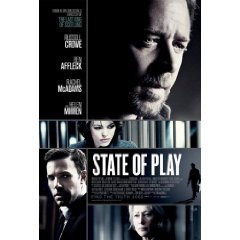State of Play: film review
State of Play, a new film starring Russell Crowe and Ben Affleck is an adaptation of the widely-praised BBC six-part drama of the same name from 2003. The story is essentially the same – journalist investigating political scandal swirling around a politician who is also an old friend – but transplanted to the US, with the Iraq war as the backdrop with a veneer of blogging added.
 Crowe plays the part of the experienced, cynical journalist – a role he landed after Brad Pitt dropped out following script disagreements. The contrast between the unkempt, unglamorous, unfit Crowe and the world of political glamour works well and it is hard to see how Pitt would have carried off the role as well.
Crowe plays the part of the experienced, cynical journalist – a role he landed after Brad Pitt dropped out following script disagreements. The contrast between the unkempt, unglamorous, unfit Crowe and the world of political glamour works well and it is hard to see how Pitt would have carried off the role as well.
(You do have to admire the cheek with which the whole incident is air-brushed out from the film’s official Production Notes. It’s no great surprise that Pitt isn’t mentioned, but the Notes do contain this, “When considering actors for the part, the team had a fortunate break. Macdonald [the director] recalls: ‘The studio said to me, ‘Who do you want?’ I said, ‘I want the best actor in the world, and that’s Russell Crowe.’ And they said, ‘Okay, let’s see’. So we sent Russell the script.”)
Although the film’s promoters have talked about how the addition of a blogger to the cast of characters makes this film in part about how the old media are coping with the rise of the new media, this is perhaps the least convincing part of the film. Blogging versus traditional journalism gets a few lines early and late in the film, but the core of the film is written as if blogging still didn’t exist. Back in 2003, when blogging was much rarer, a key part of the drama of the story was journalists up against newspaper print deadlines. Now the news cycle is a very different beast, yet for most of the film it is as if none of this has happened and, token blogger aside, the news cycle is still all about the late night/early morning print deadline.
The other wrong note is struck by the final twist at the film nears its end. It is the same as it was in the TV series, but whilst in the later case the twist came as a shocking revelation, in the film it’s more matter of fact, “Oh look, the film is near the end, so let’s have one last twist.” In part this is because the twist shifts your understanding of the characters and how they relate and, even at 127 minutes, the film can’t replicate the impact of a TV series where you have built up your knowledge of the characters over six weeks.
These, though, are two rare missteps in the film overall, and indeed despite containing many scenes that are the staple of dozens of films and TV series (editor arguing with journalist in their office, journalist talking to policeman at scene of crime, etc.) they are filmed with originality and freshness. Added in are shots of people in the background and helicopters flying over head that not only keep a sense of uncertainty going (which, if any, will turn out to matter to the plot?) but also a sense of action taking place on a bigger stage, where the characters are but part of the wider life of the city.
Running through it all is a plot closely drawn from the original TV series that offers tension and drama whilst always staying just the right side of believable, and mystery and suspense without offering up so many leads and false leads as to confuse.
All in all, a very enjoyable way of spending two hours.
The original BBC series – an even better way of spending an even longer period – is available on DVD, rather oddly labelled “Series 1”.
Political hacks reviewing films?! First @ConallMcD on ‘In the Loop’, now @markpack on ‘State of Play’ http://tinyurl.com/dyg7eg